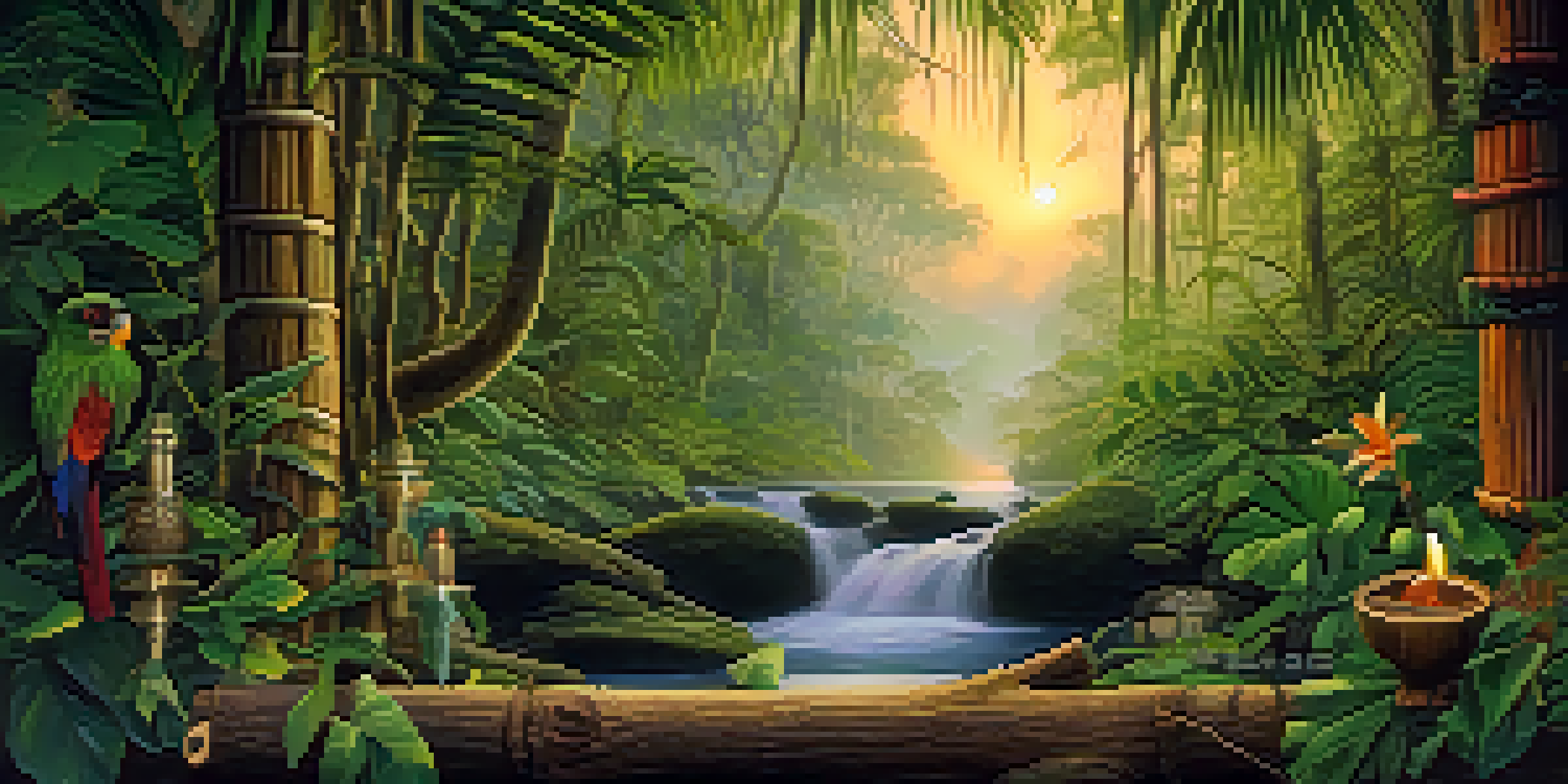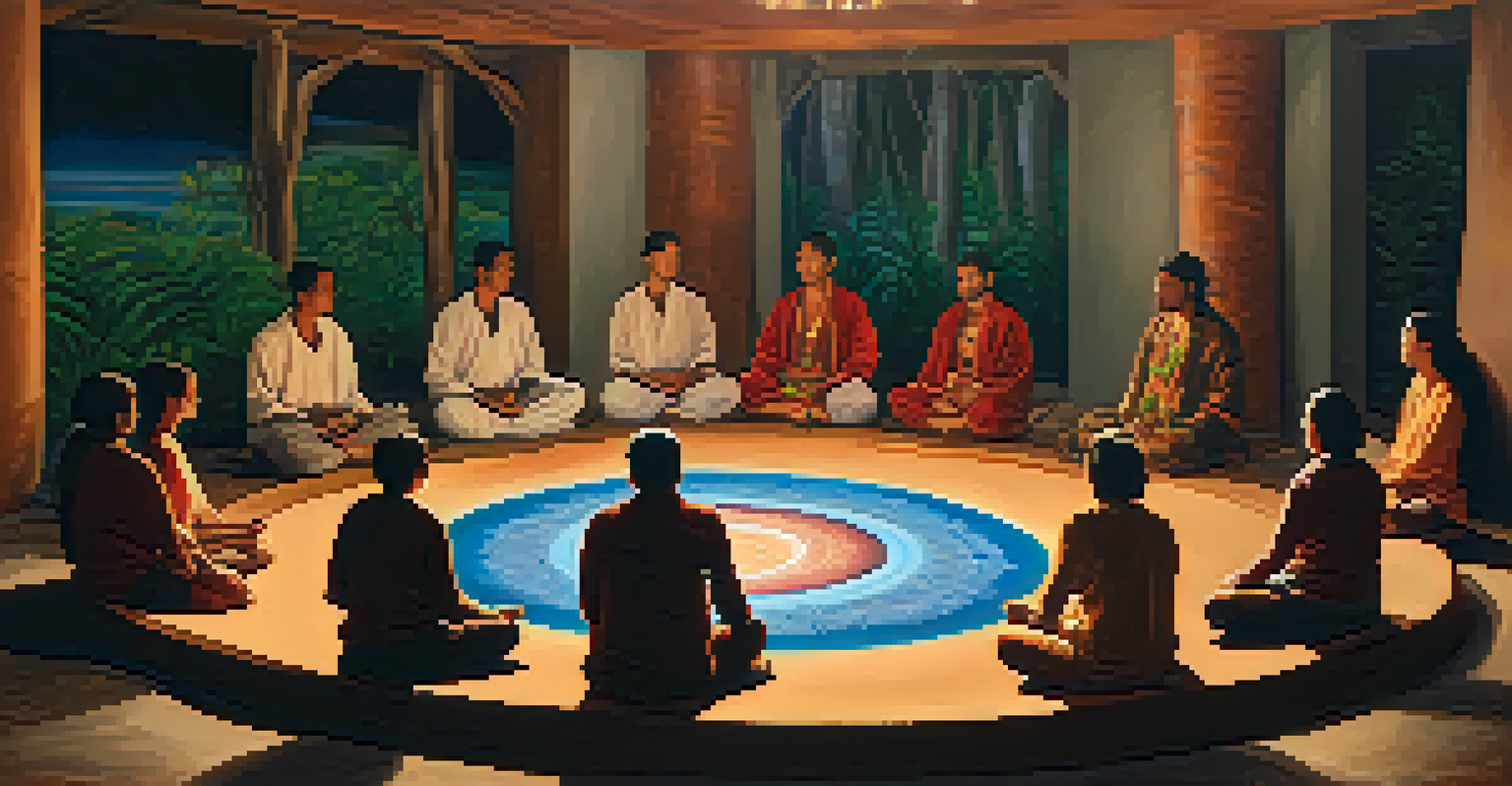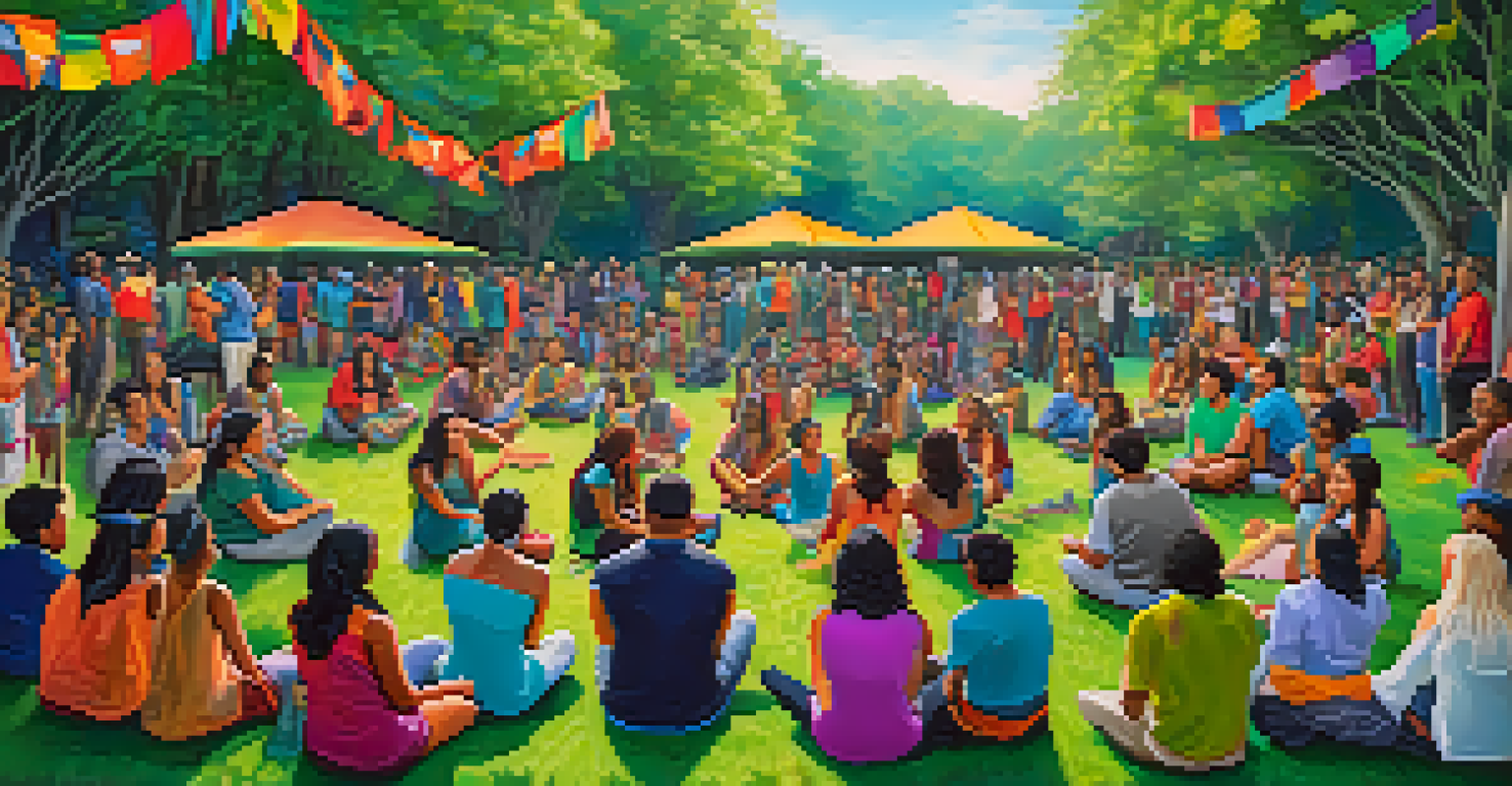Ayahuasca in Urban Settings: A Blend of Tradition and Modernity

Understanding Ayahuasca: A Brief Overview
Ayahuasca is a powerful plant medicine traditionally used by Indigenous cultures in the Amazon for spiritual and healing purposes. Its main ingredients, the Banisteriopsis caapi vine and the Psychotria viridis leaf, work together to create a profound psychedelic experience. This brew has been revered for centuries, often during rituals led by experienced shamans, who guide participants through their journeys.
The experience of ayahuasca is not just about the journey within, but also about the connections we forge with others along the way.
In a typical ceremony, participants consume ayahuasca in a communal setting, where they often experience vivid visions and deep emotional insights. Many people report transformative experiences that can lead to personal growth and healing from trauma. However, its use outside traditional contexts can raise questions about authenticity and safety.
As ayahuasca's popularity spreads beyond the Amazon, it's essential to understand its roots and the cultural significance it holds. While Western interest has surged, preserving its traditional practices and respect for its origins is crucial for a meaningful experience.
The Urban Ayahuasca Movement: A Growing Trend
In recent years, urban centers have seen a rise in ayahuasca ceremonies, often organized by retreat centers or wellness practitioners. These events attract individuals seeking healing and personal insight, drawn by stories of deep transformation. However, the urban setting can change the dynamics of these ceremonies, often stripping them of their traditional context.

While some practitioners strive to maintain authenticity by incorporating elements of traditional ceremonies, others may inadvertently commercialize the experience. This commercialization can lead to a dilution of the spiritual and cultural significance of ayahuasca, raising ethical concerns about appropriation and respect for Indigenous practices.
Ayahuasca's Cultural Significance
Understanding and respecting the Indigenous roots of ayahuasca is crucial for a meaningful and authentic experience.
Despite these challenges, the urban ayahuasca movement offers a unique blend of tradition and modernity, creating spaces where individuals from diverse backgrounds can connect with their inner selves. As this trend continues to evolve, it’s vital to foster a respectful dialogue about the role of ayahuasca in contemporary society.
Navigating Safety and Legality in Urban Settings
One of the critical concerns surrounding ayahuasca in urban settings is safety. Participants should be aware of potential health risks associated with the brew, including interactions with medications and underlying mental health issues. Responsible facilitators often screen participants to ensure a safe experience, but this is not always the case.
Cultural exchange enriches our understanding of the world, but it requires respect and acknowledgment of those who came before us.
Additionally, the legality of ayahuasca varies across different regions, with some countries allowing its use for religious purposes while others classify it as an illegal substance. This legal ambiguity can create a risky environment for participants, as unregulated ceremonies may lack proper oversight and safety protocols.
To navigate these complexities, individuals interested in participating in ayahuasca ceremonies should do thorough research. Seeking out experienced and reputable facilitators can help ensure a safer and more authentic experience, bridging the gap between tradition and modern practices.
Cultural Appropriation vs. Cultural Exchange
As ayahuasca gains popularity in urban settings, the conversation around cultural appropriation becomes increasingly relevant. Many Indigenous communities view the commodification of their sacred practices as a form of exploitation, while others believe that sharing these traditions can foster understanding and healing. This tension highlights the need for respectful engagement with Indigenous cultures.
Cultural exchange involves learning from and honoring the traditions of others, rather than merely taking elements for personal gain. It’s essential for participants to approach ayahuasca with humility and respect, acknowledging its origins and the people who have traditionally used it for healing.
Safety in Urban Ayahuasca Ceremonies
Participants must prioritize safety by researching facilitators and being aware of health risks and legal issues surrounding ayahuasca.
By fostering open dialogue and collaboration with Indigenous practitioners, urban participants can engage in a more meaningful way. This approach not only honors the roots of ayahuasca but also enriches the experience for everyone involved.
Personal Transformation: Stories from Urban Participants
Many individuals who have participated in urban ayahuasca ceremonies share stories of profound personal transformation. These narratives often highlight themes of healing, self-discovery, and reconnection with nature. For example, one participant described how ayahuasca helped her confront deep-seated fears, ultimately leading to a newfound sense of purpose in her life.
The power of these experiences can be both inspiring and daunting, as participants navigate the aftermath of their journeys. Integrating insights gained during ayahuasca ceremonies into everyday life can be a challenging process, requiring reflection and support from communities that understand the experience.
While each person's journey is unique, the shared experiences of transformation often create a sense of connection among urban participants. This sense of community can be incredibly healing, providing a support system as individuals continue to explore their inner landscapes.
The Role of Community in Urban Ayahuasca Experiences
Community plays a vital role in the ayahuasca experience, particularly in urban settings where participants may feel isolated. Many retreat centers foster a sense of belonging, allowing individuals to connect with like-minded people who share similar quests for healing and understanding. This communal aspect can enhance the overall journey, providing emotional support and encouragement.
Moreover, the act of sharing experiences with others can deepen personal insights. Participants often find that discussing their journeys helps them process their experiences and integrate the lessons learned. This communal sharing fosters empathy and understanding, creating a safe space for vulnerability.
Community Enhances the Experience
A strong sense of community in urban ayahuasca settings can provide essential support and deepen personal insights during transformative journeys.
As urban ayahuasca spaces continue to emerge, the importance of cultivating strong, supportive communities cannot be overstated. These connections can help individuals navigate their journeys, fostering growth and resilience as they explore the depths of their consciousness.
Looking Ahead: The Future of Ayahuasca in Urban Areas
As interest in ayahuasca continues to grow, the future of its practice in urban areas remains both exciting and uncertain. The challenge will be to balance the demand for ayahuasca experiences with a commitment to preserving its cultural significance. This requires ongoing dialogue between Indigenous communities and urban practitioners, ensuring that traditional practices are honored.
Additionally, education about the potential risks and benefits of ayahuasca will be crucial as more people seek out these experiences. Workshops, seminars, and resources can help demystify the process, providing participants with the knowledge they need to engage responsibly.

Ultimately, the future of ayahuasca in urban settings hinges on respect, integrity, and community. By embracing both tradition and modernity, we can create a more inclusive and mindful approach to this powerful plant medicine.